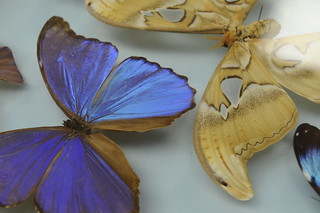Auburn University's Museum of Natural History offering 'First Wednesdays' tours
Article body
The Auburn University Museum of Natural History has initiated a new program, "First Wednesdays," providing an opportunity for the community to explore the approximately two million specimens found in the museum's eight collections. On the first Wednesday of every month, tours are available by appointment from 4 to 6 p.m. During the tour, items from the museum's collections will be on display and staff will be on hand to answer questions.
"We are incredibly proud of our museum collections," said the museum's director, Jason Bond, "and we hope everyone will take advantage of this great opportunity to see the collections firsthand, interact with museum staff, see more of what Auburn University has to offer, and experience the rich biodiversity of Alabama and the world."
Museum tours are ideal for large groups and can be customized to complement specific topics such as "carnivores, omnivores and herbivores" or "reptiles and amphibians." A conference room and classroom are also available, providing a setting for activities such as live-animal presentations. The museum welcomes school groups. Educational groups can also contact museum staff to schedule tours at other times during the week. Staff members are certified in educational programs like Project Learning Tree, Project Wild, Project Wet, Project Flying Wild and Growing up Wild, among others.
"Providing opportunities for the schools and the public at large to learn about the amazing research at the Museum of Natural History is very exciting," said Kay Stone, Museum of Natural History outreach program administrator. "Group tours are available by appointment and can be tailored to meet your curriculum and content needs."
The state of Alabama boasts more than 4,500 identified species, most of which are included among the museum's eight collections, including fishes; mammals; arachnids and myriapods; aquatic invertebrates; plants; amphibians and reptiles; birds and insects. As a collections-based museum, the specimens are primarily used by Auburn University professors, students and researchers from around the world conducting biodiversity research.
The Museum of Natural History is housed in the Biodiversity Learning Center, a new 15,000-square-foot facility on the Auburn University campus. The Biodiversity Learning Center is located between M. White Smith Hall and Rouse Life Sciences Building and is accessible from Mell Street.
There is no fee to participate in First Wednesdays. To register, go to http://aumnh.org/visit_the_museum/.
For more information or to register a large group, contact Kay Stone at (334) 844-4132 or stonemk@auburn.edu.
Related Media
Related Links
Media interested in this story can contact Communications Director Preston Sparks at (334) 844-9999 or preston.sparks@auburn.edu.
Auburn University is a nationally ranked land grant institution recognized for its commitment to world-class scholarship, interdisciplinary research with an elite, top-tier Carnegie R1 classification, life-changing outreach with Carnegie’s Community Engagement designation and an undergraduate education experience second to none. Auburn is home to more than 30,000 students, and its faculty and research partners collaborate to develop and deliver meaningful scholarship, science and technology-based advancements that meet pressing regional, national and global needs. Auburn’s commitment to active student engagement, professional success and public/private partnership drives a growing reputation for outreach and extension that delivers broad economic, health and societal impact.







